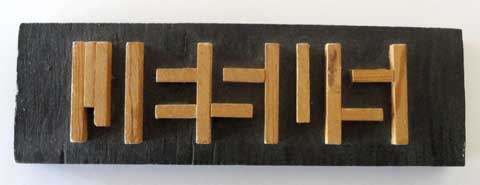the sinner caught sinning
Twice in Matthew's gospel Jesus references Hosea.
The first time is after he calls Matthew the tax collector to join him. Matt ends up hosting a party for Jesus and invites all his sinful friends to come meet Jesus, his new boss. The religious dudes can't believe Jesus is associating with the losers. Jesus says to them, 12 On hearing this, Jesus said, “It is not the healthy who need a doctor, but the sick. 13 But go and learn what this means: ‘I desire mercy, not sacrifice.’ For I have not come to call the righteous, but sinners.” Matt. 9
The second time Jesus and the crew are walking through a field and helping themselves to ripe heads of grain. The religious dudes have a problem with this, not because it's theft, this was an accepted practice, but because they were doing it on the Sabbath. Jesus responds, 7 "If you had known what these words mean, ‘I desire mercy, not sacrifice,’ you would not have condemned the innocent." Matt. 12
Without referencing Hosea, this principle is applied in John 8.
Here is what Isaiah has to say about mercy. Isaiah 26:10 But when grace is shown to the wicked, they do not learn righteousness; even in a land of uprightness they go on doing evil and do not regard the majesty of the Lord.
Jesus overrules Moses, does the opposite of Isaiah, and ignores the context of Hosea to prioritize and clarify what God is really about - mercy.
The religious dudes were ready to kill her on the spot, in the temple even. They wanted to kill him to, but he, as a man, had more rights than her, she was simply property. They needed Roman approval to kill Jesus. In their dialog with Pilate they say as much, John 20:31 Pilate said, “Take him yourselves and judge him by your own law.” “But we have no right to execute anyone,” they objected.
Jesus opposes religiously devout dudes and aligns himself with outcasts, sinful women, cheating men, shepherds and lepers. He does it in his life, he does it in his death, between two criminals. His resurrection does not change any of that.
Jesus is the minority report in the Bible. There is a trail of crumbs in the Old Testament that leads to Jesus. He appears in negative relief in the OT. Can you see him? He looks like the outcasts.
The first time is after he calls Matthew the tax collector to join him. Matt ends up hosting a party for Jesus and invites all his sinful friends to come meet Jesus, his new boss. The religious dudes can't believe Jesus is associating with the losers. Jesus says to them, 12 On hearing this, Jesus said, “It is not the healthy who need a doctor, but the sick. 13 But go and learn what this means: ‘I desire mercy, not sacrifice.’ For I have not come to call the righteous, but sinners.” Matt. 9
The second time Jesus and the crew are walking through a field and helping themselves to ripe heads of grain. The religious dudes have a problem with this, not because it's theft, this was an accepted practice, but because they were doing it on the Sabbath. Jesus responds, 7 "If you had known what these words mean, ‘I desire mercy, not sacrifice,’ you would not have condemned the innocent." Matt. 12
Without referencing Hosea, this principle is applied in John 8.
2 At dawn he appeared again in the temple courts, where all the people gathered around him, and he sat down to teach them. 3 The teachers of the law and the Pharisees brought in a woman caught in adultery. They made her stand before the group 4 and said to Jesus, “Teacher, this woman was caught in the act of adultery. 5 In the Law Moses commanded us to stone such women. Now what do you say?”Here is what Moses had to say. Leviticus 20:10 If a man commits adultery with another man’s wife—with the wife of his neighbor—both the adulterer and the adulteress are to be put to death.
Here is what Isaiah has to say about mercy. Isaiah 26:10 But when grace is shown to the wicked, they do not learn righteousness; even in a land of uprightness they go on doing evil and do not regard the majesty of the Lord.
Here is what Hosea says in context.
Hosea 6
4 “What can I do with you, Ephraim? What can I do with you, Judah? Your love is like the morning mist, like the early dew that disappears.
5 Therefore I cut you in pieces with my prophets, I killed you with the words of my mouth— then my judgments go forth like the sun.
6 For I desire mercy, not sacrifice, and acknowledgment of God rather than burnt offerings. 7 As at Adam, they have broken the covenant; they were unfaithful to me there.
The religious dudes were ready to kill her on the spot, in the temple even. They wanted to kill him to, but he, as a man, had more rights than her, she was simply property. They needed Roman approval to kill Jesus. In their dialog with Pilate they say as much, John 20:31 Pilate said, “Take him yourselves and judge him by your own law.” “But we have no right to execute anyone,” they objected.
Jesus opposes religiously devout dudes and aligns himself with outcasts, sinful women, cheating men, shepherds and lepers. He does it in his life, he does it in his death, between two criminals. His resurrection does not change any of that.
Jesus is the minority report in the Bible. There is a trail of crumbs in the Old Testament that leads to Jesus. He appears in negative relief in the OT. Can you see him? He looks like the outcasts.



Comments